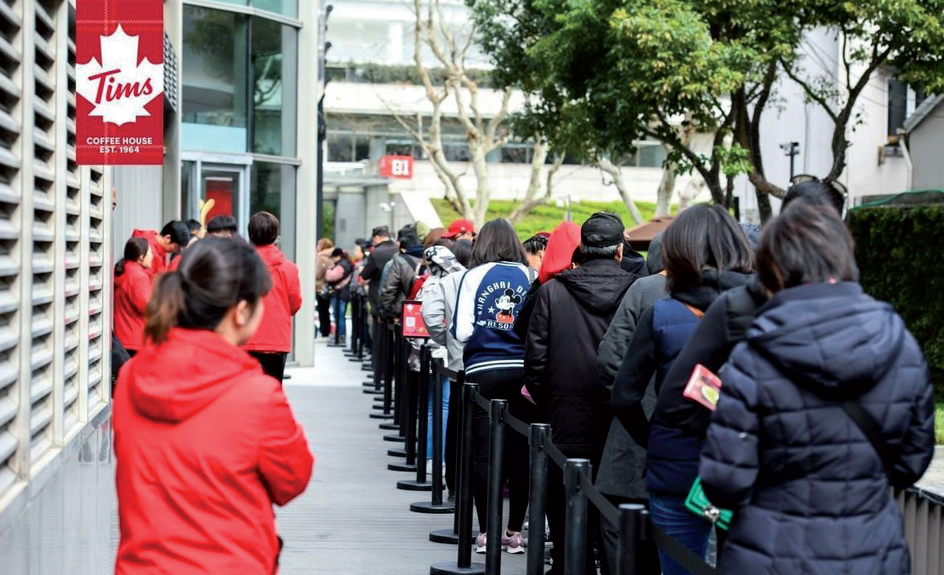Tim Hortons confident it won’t get scalded in China’s coffee market


Tim Hortons is skating into an already percolating coffee market in China.
The Canadian coffee-and-doughnut outlet opened its first shop in China on Tuesday in People’s Square in Shanghai.
Named for a famous hockey player, Tim Hortons will face robust competition, as Starbucks has operated on the Chinese mainland since 1999 and plans to have 5,000 stores there by 2021. And Beijing upstart Luckin Coffee, with its popular delivery app, is rapidly expanding, with designs on 4,500 stores by year-end.
It’s not only those two.
Other coffee-selling competitors Tim Hortons will face in China: Dunkin Donuts, the UK’s Costa Coffee (now owned by Coca-Cola), McDonald’s McCafe, KFC, Peet’s Coffee, SPR (Dandong Qijian), UBC (Taiwan), C-Straits Café, and three South Korean players – Cafe Bene, Maan Coffee and Tous Les Jours.
“Looking forward, the war between Korean, American, British [and] domestic coffee chains and stylish independent cafes … will create a great deal of diversification in the market, which will underpin extensive growth,” Esther Lau, then a retail analyst at Mintel, presciently told the Financial Times in 2014.
Add Canada to that lineup. Tim Hortons, whose parent is Restaurant Brands International Inc in Toronto, owner of Burger King, plans 1,500 stores in China in the next 10 years.
It also will try to appeal to local tastes, offering oolong tea, matcha latte and a salted egg yolk version of its signature “timbit”, doughnut.
“China is an attractive growth market and we can’t wait for guests to try our classic favourites and some new offerings crafted specifically to the Chinese market,” Tim Hortons President Alex Macedo said.
(In fairness, Starbucks sells green tea frappuccinos and red bean scones in China. It also has a delivery partnership with e-commerce giant Alibaba Group Holding Ltd.)
“Tim Hortons will need to offer not just something unique that Chinese consumers can’t find at other chains, but also spend heavily on marketing to build awareness of the brand,” Jason Yu, general manager of Kantar Worldpanel in Shanghai, told bloomberg.com.
Ask British chain Pret A Manger, which withdrew from China in December after it couldn’t catch on.
Many in China still prefer tea, or even instant coffee, which is a market dominated by Nestle. But with China’s growing middle class and its increasing embrace of café society, Chinese may eventually toss those instant coffee granules.
On Alibaba’s platforms, including Taobao and Tmall, more than 18 million consumers bought 2.5 billion yuan ($373 million) worth of coffee products in a 12-month period, up 18 percent year-over-year, reported Alibaba news site alizila.com in September. Sales of coffee beans and grounds grew 60 percent faster than instant coffee over 2017 on Alibaba platforms.
That may be why Nestle has added Starbucks coffee to its lineup.
While China consumes only three cups of coffee per capita a year versus 250 in the UK and 363 in the US, its total consumption grew 16 percent in the last decade compared with 2 percent for the rest of the world, according to the International Coffee Organization.
Millennials, too, are gulping the java. The 450 million consumers in China born after 1980 were responsible for 40 percent of coffee sales on Alibaba platforms this year.
Abdul Latheef, in a column for China Daily in 2017, wrote that the premier of Canada’s Ontario province “bemoaned the absence of Tim Hortons in the country” during a trade trip to China in 2014.
“Clearly, we need a Tim Hortons franchise,” Kathleen Wynne was quoted as telling university students, some of whom had attended Canadian schools.
Ketti Wilhelm, a freelance writer who taught English in Jinan, Shandong province, told a tale of coffee woe for freshcup.com in 2016:
“After four months of private deprivation, a university administrator sent an emissary to my door with a small, friendly Christmas present: a neatly wrapped bottle of instant Nescafé. My will was broken, and I drank.
“As soon as I’d washed the bitterness out of my mouth from my first and last cup of instant coffee, I took the hour-long bus ride to the foreign supermarket, in the city’s most upscale shopping mall, and bought a French press. The only bean option was $40-a-pound Lavazza, roasted and ground in Italy. It wasn’t cheap or particularly convenient going back to my morning indulgence, and it certainly wasn’t an exercise in localism, but I found it was possible, and it’s becoming more so every day.”
Contact the writer at williamhennelly@chinadailyusa.com

































